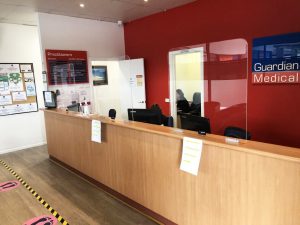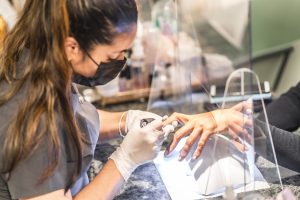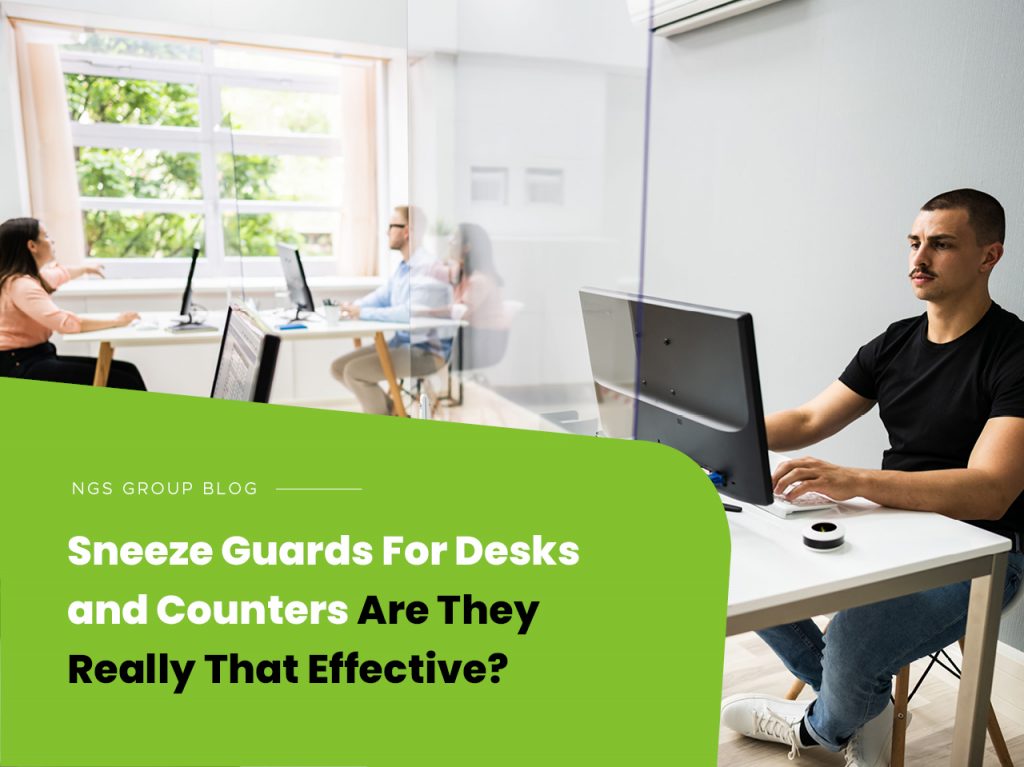It’s now more important than ever to be more precautious about keeping your business safe and healthy for your patronage and employees. Although you’re probably aware of some of these COVID-19 safety guidelines like face masks and other PPE, you may not know much about sneeze guards for desks and counters. Also called a cough shield or Perspex screen, businesses across all niches are using sneeze guards to help curb the spread of coronavirus. Here is an overview of what a sneeze guard is, how businesses use them, and the types of materials used to make them.
What are Sneeze Guards and What are They Used For?

Simply put, a sneeze guard is a PPE or protective barrier made of acrylic or plexiglass that helps businesses to combat the spread of disease-causing germs. You’ve probably seen sneeze guards in buffets or restaurants before. Johnny Garneau, a restauranter in Pennsylvania, invented sneeze shields in 1959 and has remained in the food industry ever since.
As we adjust to the new normal amid the pandemic, the sneeze guard has never been as vital as it is for businesses across the world. Companies that rely on point-of-sale purchases have encountered severe challenges in complying with social distancing at work. Thankfully, commercial sneeze shields have come in handy for these enterprises, allowing your customers and employees to conduct business while adhering to safety and infection controls in the workplace.
Where Would You Use Sneeze Guards?
Ideally, these Perspex screens were used to stop germs from spreading to food through coughing or sneezing. Today, some government procedures require self-service restaurants to have them. Also, all businesses are going for sneeze guards as a precautionary measure.
Not only does sneeze protection prevent food contamination, but also helps to safeguard your staff and clients. Placing the sneeze guards for desks and counters at your check-in desks, checkout counters, or reservation areas can limit exposure and allow your company to run safely.
Here are some real-life scenarios where sneeze shields are helping prevent the spread of coronavirus:
Petrol Stations – Many petrol stations have installed plexiglass screens at every pump. These screens are fixed at the credit card readers so germs don’t infect the next user.
Gyms and Fitness Studios – Fitness studios and gyms worldwide closed their doors following the coronavirus pandemic shutdowns. Many of these facilities are currently preparing to resume operations by implementing a series of safety measures to keep their members and staff safe. Capacity is limited based on the facility’s size. Some gym locations have a sneeze guard at check-in and no-hands door in compliance with hygiene standards.
Learning Institutions – Many administrative offices in schools are now installing sneeze guards for desks and counters. In the staff rooms, these shields provide a barrier between teachers’ desks. Similarly, sneeze screens can prevent cross-infection among students in the classroom by offering protection around each student’s desk. Alternatively, they can be used in the form of desk shields or hygiene screens dividing the rows and columns between classroom desks.
Pharmacies & Doctor’s Offices – Doctors and pharmacies handle patients with different ailments. Putting up sneeze guards is the best way to help prevent potential infections. It is a great move that keeps both healthcare providers and patients safe.
Public Transportation – You’ve probably seen buses, limousines, and taxi cabs using shields between the front and back seats. Rideshare services such as Lyft and Uber are now starting to put up these barriers inside their cars.
Reception Desks – Sneeze shields are specially designed to minimise the spread of COVID-19 in commercial premises. Therefore, anyone including customer service employees at restaurants, reception desks, and grocery checkout lines can use the added protection of hygiene screens. The protective screens can be fixed on the counter, reception desk, or bar, plus the option to nail it down to the countertop.
Types of Materials Used
Sneeze guards are available in many different materials. However, acrylic and plexiglass are the two most common materials that make cough shields because they are water-resistant and hard-wearing. Besides, the two materials are accessible and pocket-friendly, which lowers the retail price of sneeze shields.
Keep the following in mind concerning acrylic and plexiglass:
Acrylic – It is an industrial plastic that usually comes in clear sheets. Apart from making sneeze guards, Acrylic has many other uses such as the production of paint, furniture, medical appliances, beauty supplies, and aquariums.
Plexiglass – Made of Poly(methyl methacrylate), Plexiglass is the commercial name for Acrylic. As the trademarked form of acrylic plastic, this material comes with various names. Plexiglass is used not only for sneeze shields but also for lights, digital screens, windows, and signages.
Other Materials:
PVC or Polycarbonate & Vinyl – PVC, the more elastic and less flammable form of plastic, and vinyl are becoming common in the manufacture of Perspex screens. To address growing concerns over the use of sneeze guards for desks and counters in New York, for example, the NYSED issued a directive saying that some shields must be polycarbonate in adherence to the fire code.
Glass – Glass would have been an ideal material for manufacturing this Personal Protection Equipment, PPE, save for a few shortcomings. First, it doesn’t meet the weight requirements because it is a lot heavier than today’s industry-preferred options. Moreover, the delicate nature of non-tempered glass means it is more likely to be damaged. A spike in recurrent expenditure is the last thing you want for your company, especially now when cutting losses amidst COVID-19 disease restrictions is the top priority for everyone else.
Are Sneeze Guards Effective in Preventing the Spread of Viruses?
Most viruses including COVID-19, spread when spray and spittle from your mouth and nose land on people and other surfaces around you. For example, inhaling cough spray from Coronavirus patients can infect you with coronavirus. Acrylic, polycarbonate, plexiglass, and vinyl are water-resistant.
When used to make sneeze guards for desks and counters, you’ll have a protective barrier between your customers and your employees. As a result, the shield stops contaminated spittle from landing on people and surfaces. However, cough droplets may stick on either side of the screen.
Therefore, it’s essential to clean your sneeze guards regularly. Avoiding direct contact while at that. Make sure to wear a face mask, disposable gloves, and safety goggles.
Do You Need To Install Sneeze Guards for Desks and Counters?

There’s no requirement to have sneeze guards during the COVID-19 pandemic, although they are recommended. In Australia, for example, the current government doesn’t find it necessary to install Perspex screens between the public and employees. The reason is that the interaction between customers and business attendants is short. However, many businesses have installed sneeze guards in order to protect workers and customers.
Nevertheless, many businesses are installing these screens to safeguard workers, especially in pharmacies, hospitals, retail stores, doctors’ offices, and other setups. Some health organisations support this move. For instance, in the U.S., the CDC notes that businesses should consider placing a barrier between customers and employees.
Installing sneeze guards for desks and counters is an excellent precautionary measure. You’ll want to keep it in mind, particularly when reopening your restaurant or store after several months of closure. No matter how simple, every little action is a step towards ensuring your customers’ safety. In that regard, cough shields are effective Personal Protection Equipment, PPE, for two people who are close to each other, such as in the business environment.
Conclusion
Same as face masks and other PPEs, sneeze shields are effective and work similarly. They prevent spittle and spray from your mouth and nose from landing on nearby surfaces and people. Because of that, sneeze guards for desks and counters are another defensive mechanism against common viruses like the novel Coronavirus. If you are thinking about installing a sneeze guard at your business give NGS Group a call on (03) 9432 7111.

